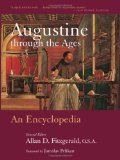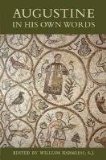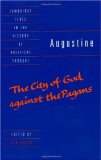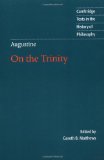|
Relevant
books
available at Amazon
Many Augustine
translations
and studies with links to Amazon
A selection below
 
Peter Brown biography
--------
 
Allan Fitzgerald --------
 
Henry Chadwick
a short indroduction --------
 
William Harmless.
Extracts from several of Augustine's main works --------
 
Henry Chadwick's translation of "Confessions" --------
 
R.W.Dyson's translation of "The City of God" --------
 
R.P.H. Green's translation of "On Christian Teaching" --------
 
Gareth Matthews' translation of "On The Trinity" (books 8 - 15) |
Chapter 41.—About the Discord of Philosophic Opinion, and the
Concord of the Scriptures that are Held as Canonical by the Church.
But let us omit further examination of history, and return to the philosophers
from whom we digressed to these things. They seem to have labored in their
studies for no other end than to find out how to live in a way proper for laying
hold of blessedness. Why, then, have the disciples dissented from their masters,
and the fellow-disciples from one another, except because as men they have
sought after these things by human sense and human reasonings? Now, although
there might be among them a desire of glory, so that each wished to be thought
wiser and more acute than another, and in no way addicted to the judgment of
others, but the inventor of his own dogma and opinion, yet I may grant that
there were some, or even very many of them, whose love of truth severed them
from their teachers or fellow-disciples, that they might strive for what they
thought was the truth, whether it was so or not. But what can human misery do,
or how or where can it reach forth, so as to attain blessedness, if divine
authority does not lead it? Finally, let our authors, among whom the canon of
the sacred books is fixed and bounded, be far from disagreeing in any respect.
It is not without good reason, then, that not merely a few people prating in the
schools and gymnasia in captious disputations, but so many and great people,
both learned and unlearned, in countries and cities, have believed that God
spoke to them or by them, i.e. the canonical writers, when they wrote these
books. There ought, indeed, to be but few of them, lest on account of their
multitude what ought to be religiously esteemed should grow cheap; and yet not
so few that their agreement should not be wonderful. For among the multitude of
philosophers, who in their works have left behind them the monuments of their
dogmas, no one will easily find any who agree in all their opinions. But to show
this is too long a task for this work.
But what author of any sect is so approved in this demon-worshipping city, that
the rest who have differed from or opposed him in opinion have been disapproved?
The Epicureans asserted that human affairs were not under the providence of the
gods; and the Stoics, holding the opposite opinion, agreed that they were ruled
and defended by favorable and tutelary gods. Yet were not both sects famous
among the Athenians? I wonder, then, why Anaxagoras was accused of a crime for
saying that the sun was a burning stone, and denying that it was a god at all;
while in the same city Epicurus flourished gloriously and lived securely,
although he not only did not believe that the sun or any star was a god, but
contended that neither Jupiter nor any of the gods dwelt in the world at all, so
that the prayers and supplications of men might reach them! Were not both
Aristippus and Antisthenes there, two noble philosophers and both Socratic? yet
they placed the chief end of life within bounds so diverse and contradictory,
that the first made the delight of the body the chief good, while the other
asserted that man was made happy mainly by the virtue of the mind. The one also
said that the wise man should flee from the republic; the other, that he should
administer its affairs. Yet did not each gather disciples to follow his own
sect? Indeed, in the conspicuous and well-known porch, in gymnasia, in gardens,
in places public and private, they openly strove in bands each for his own
opinion, some asserting there was one world, others innumerable worlds; some
that this world had a beginning, others that it had not; some that it would
perish, others that it would exist always; some that it was governed by the
divine mind, others by chance and accident; some that souls are immortal, others
that they are mortal,—and of those who asserted their immortality, some said
they transmigrated through beasts, others that it was by no means so; while of
those who asserted their mortality, some said they perished immediately after
the body, others that they survived either a little while or a longer time, but
not always; some fixing supreme good in the body, some in the mind, some in
both; others adding to the mind and body external good things; some thinking
that the bodily senses ought to be trusted always, some not always, others
never. Now what people, senate, power, or public dignity of the impious city has
ever taken care to judge between all these and other well-nigh innumerable
dissensions of the philosophers, approving and accepting some, and disapproving
and rejecting others? Has it not held in its bosom at random, without any
judgment, and confusedly, so many controversies of men at variance, not about
fields, houses, or anything of a pecuniary nature, but about those things which
make life either miserable or happy? Even if some true things were said in it,
yet falsehoods were uttered with the same licence; so that such a city has not
amiss received the title of the mystic Babylon. For Babylon means confusion, as
we remember we have already explained. Nor does it matter to the devil, its
king, how they wrangle among themselves in contradictory errors, since all alike
deservedly belong to him on account of their great and varied impiety.
But that nation, that people, that city, that republic, these Israelites, to
whom the oracles of God were entrusted, by no means confounded with similar
licence false prophets with the true prophets; but, agreeing together, and
differing in nothing, acknowledged and upheld the authentic authors of their
sacred books. These were their philosophers, these were their sages, divines,
prophets, and teachers of probity and piety. Whoever was wise and lived
according to them was wise and lived not according to men, but according to God
who hath spoken by them. If sacrilege is forbidden there, God hath forbidden it.
If it is said, “Honor thy father and thy mother,” God hath commanded it. If it
is said, “Thou shall not commit adultery, Thou shall not kill, Thou shall not
steal,” and other similar commandments, not human lips but the divine oracles
have enounced them. Whatever truth certain philosophers, amid their false
opinions, were able to see, and strove by laborious discussions to persuade men
of,—such as that God had made this world, and Himself most providently governs
it, or of the nobility of the virtues, of the love of country, of fidelity in
friendship, of good works and everything pertaining to virtuous manners,
although they knew not to what end and what rule all these things were to be
referred,—all these, by words prophetic, that is, divine, although spoken by
men, were commended to the people in that city, and not inculcated by contention
in arguments, so that he who should know them might be afraid of contemning, not
the wit of men, but the oracle of God.
Chapter 42.—By What Dispensation of God’s Providence the Sacred Scriptures of
the Old Testament Were Translated Out of Hebrew into Greek, that They Might Be
Made Known to All the Nations.
One of the Ptolemies, kings of Egypt, desired to know and have these sacred
books. For after Alexander of Macedon, who is also styled the Great, had by his
most wonderful, but by no means enduring power, subdued the whole of Asia, yea,
almost the whole world, partly by force of arms, partly by terror, and, among
other kingdoms of the East, had entered and obtained Judea also, on his death
his generals did not peaceably divide that most ample kingdom among them for a
possession, but rather dissipated it, wasting all things by wars. Then Egypt
began to have the Ptolemies as her kings. The first of them, the son of Lagus,
carried many captive out of Judea into Egypt. But another Ptolemy, called
Philadelphus, who succeeded him, permitted all whom he had brought under the
yoke to return free; and more than that, sent kingly gifts to the temple of God,
and begged Eleazar, who was the high priest, to give him the Scriptures, which
he had heard by report were truly divine, and therefore greatly desired to have
in that most noble library he had made. When the high priest had sent them to
him in Hebrew, he afterwards demanded interpreters of him, and there were given
him seventy-two, out of each of the twelve tribes six men, most learned in both
languages, to wit, the Hebrew and Greek and their translation is now by custom
called the Septuagint. It is reported, indeed, that there was an agreement in
their words so wonderful, stupendous, and plainly divine, that when they had sat
at this work, each one apart (for so it pleased Ptolemy to test their fidelity),
they differed from each other in no word which had the same meaning and force,
or, in the order of the words; but, as if the translators had been one, so what
all had translated was one, because in very deed the one Spirit had been in them
all. And they received so wonderful a gift of God, in order that the authority
of these Scriptures might be commended not as human but divine, as indeed it
was, for the benefit of the nations who should at some time believe, as we now
see them doing.
Chapter 43.—Of the Authority of the Septuagint Translation, Which, Saving the
Honor of the Hebrew Original, is to Be Preferred to All Translations.
For while there were other interpreters who translated these sacred oracles out
of the Hebrew tongue into Greek, as Aquila, Symmachus, and Theodotion, and also
that translation which, as the name of the author is unknown, is quoted as the
fifth edition, yet the Church has received this Septuagint translation just as
if it were the only one; and it has been used by the Greek Christian people,
most of whom are not aware that there is any other. From this translation there
has also been made a translation in the Latin tongue, which the Latin churches
use. Our times, however, have enjoyed the advantage of the presbyter Jerome, a
man most learned, and skilled in all three languages, who translated these same
Scriptures into the Latin speech, not from the Greek, but from the Hebrew. But
although the Jews acknowledge this very learned labor of his to be faithful,
while they contend that the Septuagint translators have erred in many places,
still the churches of Christ judge that no one should be preferred to the
authority of so many men, chosen for this very great work by Eleazar, who was
then high priest; for even if there had not appeared in them one spirit, without
doubt divine, and the seventy learned men had, after the manner of men, compared
together the words of their translation, that what pleased them all might stand,
no single translator ought to be preferred to them; but since so great a sign of
divinity has appeared in them, certainly, if any other translator of their
Scriptures from the Hebrew into any other tongue is faithful, in that case he
agrees with these seventy translators, and if he is not found to agree with
them, then we ought to believe that the prophetic gift is with them. For the
same Spirit who was in the prophets when they spoke these things was also in the
seventy men when they translated them, so that assuredly they could also say
something else, just as if the prophet himself had said both, because it would
be the same Spirit who said both; and could say the same thing differently, so
that, although the words were not the same, yet the same meaning should shine
forth to those of good understanding; and could omit or add something, so that
even by this it might be shown that there was in that work not human bondage,
which the translator owed to the words, but rather divine power, which filled
and ruled the mind of the translator. Some, however, have thought that the Greek
copies of the Septuagint version should be emended from the Hebrew copies; yet
they did not dare to take away what the Hebrew lacked and the Septuagint had,
but only added what was found in the Hebrew copies and was lacking in the
Septuagint, and noted them by placing at the beginning of the verses certain
marks in the form of stars which they call asterisks. And those things which the
Hebrew copies have not, but the Septuagint have, they have in like manner marked
at the beginning of the verses by horizontal spit-shaped marks like those by
which we denote ounces; and many copies having these marks are circulated even
in Latin. But we cannot, without inspecting both kinds of copies, find out those
things which are neither omitted nor added, but expressed differently, whether
they yield another meaning not in itself unsuitable, or can be shown to explain
the same meaning in another way. If, then, as it behoves us, we behold nothing
else in these Scriptures than what the Spirit of God has spoken through men, if
anything is in the Hebrew copies and is not in the version of the Seventy, the
Spirit of God did not choose to say it through them, but only through the
prophets. But whatever is in the Septuagint and not in the Hebrew copies, the
same Spirit chose rather to say through the latter, thus showing that both were
prophets. For in that manner He spoke as He chose, some things through Isaiah,
some through Jeremiah, some through several prophets, or else the same thing
through this prophet and through that. Further, whatever is found in both
editions, that one and the same Spirit willed to say through both, but so as
that the former preceded in prophesying, and the latter followed in
prophetically interpreting them; because, as the one Spirit of peace was in the
former when they spoke true and concordant words, so the selfsame one Spirit
hath appeared in the latter, when, without mutual conference they yet
interpreted all things as if with one mouth.
|

